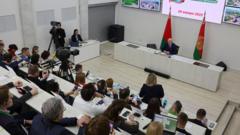In a recent BBC interview, Belarusian President Alexander Lukashenko responded to questions regarding the legitimacy of the most recent presidential elections, characterized by critics as a significant affront to democracy. As he arrived at Polling Station 478 in Minsk to cast his ballot, Lukashenko delivered a lengthy four-and-a-half hour press conference live on state television, discussing the controversial vote and defending his government's actions.
When questioned by BBC Russia editor Steve Rosenberg about how he could refer to the election as democratic, given that leading rivals were largely absent, being imprisoned or exiled, Lukashenko acknowledged the situation but framed it as a matter of personal choice. "Some are in prison, and some are in exile. But you are here!" he asserted, emphasizing the importance of freedom to choose.
Lukashenko's rhetoric stems from a long history of authoritarianism, with his critics highlighting the harsh crackdown on dissent following the 2020 electoral protests that left over 1,200 political prisoners in Belarus. Rosenberg pressed the president on the imprisonment of critics like Maria Kolesnikova and Sergei Tikhanovsky, to which Lukashenko responded by equating political dissent with criminality. "Prison is for people who have opened their mouths too wide and who have broken the law," he stated, maintaining that ignorance of the law does not excuse one from its consequences.
Despite the limited number of challengers on the ballot—many seen as nominal opponents supporting Lukashenko—he dismissed concerns about the election process. "This is a whole new experience for you!" he quipped to laughter from government-friendly journalists. He further posited that the presence of candidates from supportive factions, like the Communist Party, did not negate the legitimacy of the election.
International reactions have condemned the vote, with EU foreign policy chief Kaja Kallas labeling it as a blatant affront to democratic principles. However, Lukashenko expressed indifference towards this criticism, asserting, "I couldn't care less whether you recognise our election or whether you don't. The most important thing for me is that the people of Belarus recognise it." This stance encapsulates his long-held position as he clings to power in an increasingly isolated position on the global stage.



















